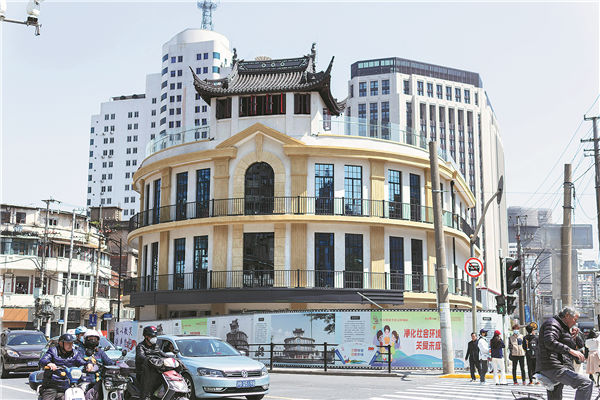

Spaniard who launched the city's first cinema is the subject of an upcoming documentary, Zhang Kun reports.
Unknown to most, the late Antonio Ramos Espejo, once played a crucial role in the development of cinemas in Shanghai.
The Spaniard's contribution, recently discovered by Chen Dake, a teacher at Shanghai International Studies University, is the focus of a documentary by students.
The students say they hope to have a draft version of the 30-minute film released during the Shanghai International Film Festival, scheduled to take place from June 9 to 18.
Chen says he was on a job assignment in Shanghai's Hongkou district when he chanced upon a research paper on Ramos by Spanish scholar Juan Ignacio Toro Escudero.
Intrigued by this finding, Chen quickly showed the paper to his students and suggested that they make a documentary on Ramos.
"Our first campus is in Hongkou, and I believe that our students, with a background of international studies, are capable of digging out the facts and telling the story," Chen says.
Most from the 16-member team for the documentary study in the broadcast journalism department of the university. Ding Yiwen, a doctoral candidate, majoring in Spanish, was invited to be a part of crew because of her language proficiency and knowledge of Spain.
"Ramos' story was new to me, and the communication between China and Spain, and Hollywood are all very interesting," says Ding, who, during her internship at Instituto Cervantes in Shanghai, worked on projects on Spanish influence in Shanghai.
Born in 1875, Ramos started screening films at tea houses and entertainment venues in the Chinese city in 1903. In 1908, he transformed a skating rink at the crossing of Haining Road and Zhapu Road into the Colon Cinematograph (Kelong Yingxiyuan), the first cinema in Shanghai, and perhaps China. However, some scholars argue that was done in 1906.
The 250-seater cinema was later renamed Hongkew (old spelling of Hongkou) Cinema.
Shun Pao, a leading Chinese newspaper, founded in 1872 in Shanghai, once reported that one of the first films shown at the cinema, was a foreign production titled Dragon's Nest.
According to the Spanish scholar's paper, this documentary is about the funerals of Emperor Guangxu and Empress Dowager Cixi of the Qing Dynasty (1644-1911).
In 1909, Ramos founded the Victoria Cinema, which featured more elaborate decorations, at the crossing of Haining Road and Sichuan Road North. In 1914, this cinema screened the first movie with sound in China.
Before long, new cinemas by competitors, such as a Portuguese man named S.G. Hertzberg, who opened the Apollo Cinema on Haining Road, emerged. At the peak of the cinema industry in Shanghai, the area along Haining Road had about a dozen cinemas.
The booming business brought much success to Ramos, who once owned at least eight cinemas in Shanghai, Hankou in Hubei province, and Macao.
Unfortunately, the students are unable to capture all such venues on film — the Hongkew Cinema was demolished in 1998 to make way for the expansion of Haining Road.
A stone stele at the street corner is the only trace of the cinema left today.
They did however find the old Willie's Theatre that is currently being restored. Built in 1929, the cinema was originally called Hollywood Theatre and had over the years taken on several other names before being known as Shengli (meaning victory) Cinema after the People's Republic of China was founded in 1949.
"We will interview experts about Chinese movie history, and ask them to show us around the area," says Shen Yicheng, a junior student who is part of the documentary crew.
"We also plan to do some shooting at the Shanghai Film Museum and hope to access documents about the period."
According to research, Ramos expanded his business portfolio to include other entertainment offerings — he even tried to make a film — that never succeeded.